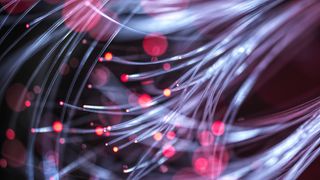Quantum is 'the future of AWS system security', Amazon claims
With third major quantum investment, AWS sets stage for next decade of network infrastructure

Amazon Web Services have announced a new Center for Quantum Networking, which will join the ranks of its AWS Center for Quantum Computing and Amazon Quantum Solutions Lab in seeking out and developing new hardware and software to support quantum systems.
The company indicated that emerging quantum networking is to play a key role in the future of AWS, and that it boasts “fascinating possible applications” that put it at an advantage against conventional networking.
The move comes after last month's announcement that AWS would be joining Q-NEXT, a quantum research centre led by the US Department of Energy's Argonne National Laboratory.
Quantum key distribution (QKD), in particular, would be a major security benefit of quantum networking, according to AWS. This utilises the principle of quantum entanglement to pair a series of messages sent in the form of photons, so that sender and recipient can each read an identical representation of a unique encryption key. Encrypted messages could then be sent through traditional channels.
In regular networks, bits are the basic unit of information and capable of holding a value of either 1 or 0. In quantum networks, the basic unit of information is called a qubit and can hold a value of 1, 0, both, or neither. Once a qubit has been observed, however, its quantum value collapses and it retains a set value or 1 or 0.

Join the 90% of enterprises accelerating to the cloud
Business transformation through digital modernisation
For this reason, if anyone intercepted an encryption key sent through this method, it would be immediately apparent to the sender and recipient because the qubits that arrived with the recipient would have collapsed, and therefore be different to what was original sent.
This is the basic principle of QKD, with the physics of the process itself ensuring that encrypted messages are readable only by the sender and recipient, and easy to spot if they have been tampered with in any way.
Get the ITPro. daily newsletter
Receive our latest news, industry updates, featured resources and more. Sign up today to receive our FREE report on AI cyber crime & security - newly updated for 2024.
There is a long way to go before the current limitations of quantum networks are solved, and AWS notes that among other challenges, “special new technologies, such as quantum repeaters and transducers, will need to be developed in order to implement quantum global networks”.
The inability to amplify photons currently limits network range, while the weakness of individual photons provides a stumbling block for interaction with all but the most sensitive systems.
Despite this, the move to establish a dedicated centre for research in quantum networking indicates real confidence on the part of AWS in the long-term security potential of this research step.

Rory Bathgate is Features and Multimedia Editor at ITPro, overseeing all in-depth content and case studies. He can also be found co-hosting the ITPro Podcast with Jane McCallion, swapping a keyboard for a microphone to discuss the latest learnings with thought leaders from across the tech sector.
In his free time, Rory enjoys photography, video editing, and good science fiction. After graduating from the University of Kent with a BA in English and American Literature, Rory undertook an MA in Eighteenth-Century Studies at King’s College London. He joined ITPro in 2022 as a graduate, following four years in student journalism. You can contact Rory at rory.bathgate@futurenet.com or on LinkedIn.




